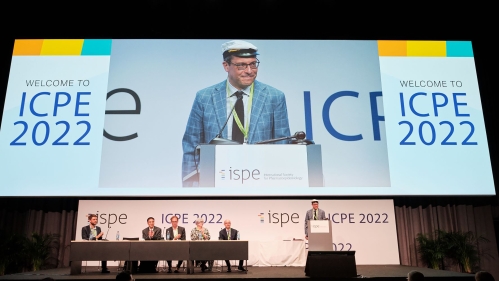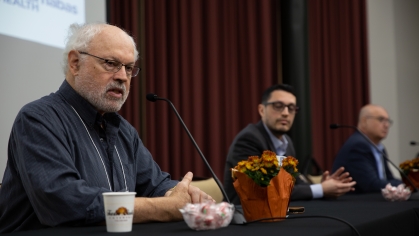Tobias Gerhard Named President of the International Society of Pharmacoepidemiology

Rutgers professor’s research focuses on the development and evaluation of pharmacoepidemiologic efforts in mental health and geriatric pharmacotherapy
Tobias Gerhard, interim director of Rutgers Institute for Health, Health Care Policy and Aging Research and founding director of Rutgers Center for Pharmacoepidemiology and Treatment Science, has been named president of the International Society for Pharmacoepidemiology (ISPE).

ISPE is an international organization dedicated to advancing the health of the public by providing a global forum for the open exchange of scientific information and for the development of policy, education and advocacy for the field of pharmacoepidemiology.
Those in the field study how drugs are used and the effects they have on large numbers of people. Referred to as a bridge science that spans clinical pharmacology and epidemiology, pharmacoepidemiology provides information on benefits and harms of drugs and other therapeutics to clinicians and to the public.
Gerhard, a professor at the Rutgers Ernest Mario School of Pharmacy, was installed as president of ISPE at the society’s annual conference in Copenhagen, Denmark, in August, after serving his term as president-elect and chair of the society’s strategic planning committee.
“It is a point of pride for Rutgers Biomedical and Health Sciences that Dr. Gerhard has assumed the presidency of ISPE,” said Brian Strom, the chancellor of Rutgers Biomedical and Health Sciences. “This recognizes Dr. Gerhard’s stature in the field, including his expertise and dedication to novel topics and methods, and anticipates his future contributions to the growth and development of pharmacoepidemiology as a scientific discipline. His demonstrated leadership abilities will be an enormous asset to ISPE.”
Gerhard’s research work focuses on the development and evaluation of modern pharmacoepidemiologic methods with applications in mental health and geriatric pharmacotherapy. His work has been funded by the National Institute on Aging, the National Institute on Mental Health and other foundations. Gerhard, who received his education from the University of Freiburg in Germany and the University of Florida also has published widely on use, safety and outcomes of therapeutics, particularly of psychotropic medications in vulnerable populations.
Gerhard has served on committees for the Federal Drug Administration and the National Academies of Sciences, Engineering and Medicine. His research has been recognized with a Young Investigator Award from the Brain and Behavior Research Foundation, a New Investigator Award from the American Society of Clinical Psychopharmacology and the 2020 Sternfels Prize for Drug Safety Discoveries.
“The International Society for Pharmacoepidemiology has been my academic home-away-from-home for almost two decades,” said Gerhard. “It is a great honor to serve as president of ISPE, a society that is at the scientific forefront of the discipline, dedicated to the training and mentoring of the next generation of researchers, and very close to my heart. I look forward to leading ISPE and working alongside many friends and colleagues around the world to advance the field of pharmacoepidemiology.”



